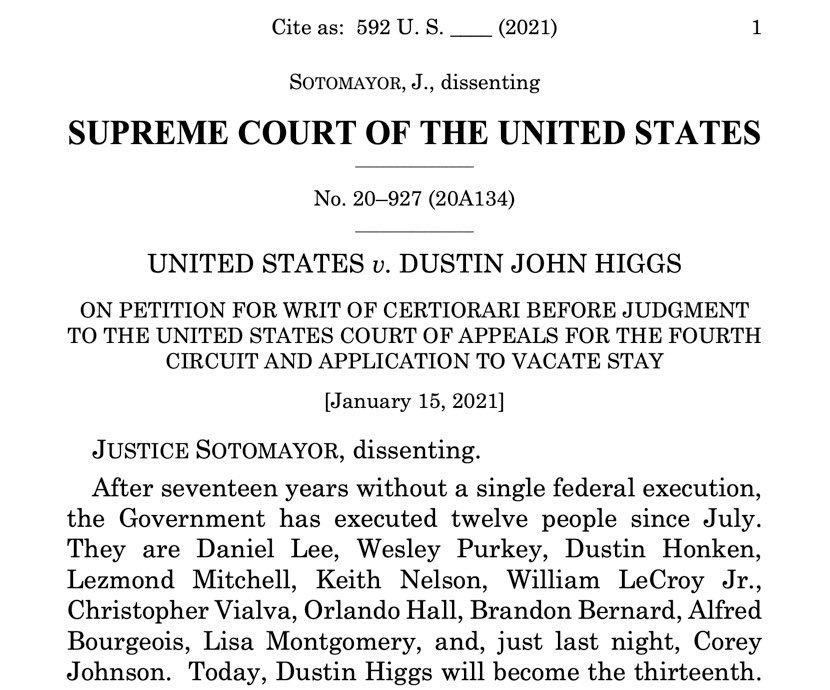
Justice Sotomayor opens her dissent in U.S. v. Dustin Higgs by saying the names of every person executed by the federal government over the past year. 

Sotomayor continues by providing historical context. The federal government has executed more people over the past six months than it had in the previous six decades.
Sotomayor details some of the legal disputes that have come up around this spree of federal executions. She goes on to say that, “against this backdrop of legal uncertainty, @TheJusticeDept did not tread carefully.”
Sotomayor explains that it was the government, not death row prisoners, that created the rush to resolve complicated legal questions on artificially compressed deadlines.
Justice Sotomayor: “The government sought emergency relief to proceed before courts had meaningful opportunities to determine if the executions were legal.” The SCOTUS “has consistently rejected inmates’ credible claims for relief.”
Sotomayor adds that the SCOTUS majority ensured that no execution challenges would ever receive meaningful consideration and that most of the Court’s decisions were made behind closed doors with no explanations provided to the public.
Summarizing the above, Sotomayor writes: “This is not justice. After waiting almost two decades to resume federal executions, the Government should have proceeded with some measure of restraint to ensure it did so lawfully. When it did not, [the SCOTUS] should have.”
Sotomayor details how the government has not met the legal standard for emergency relief. She says, in more elegant terms, that the DOJ and SCOTUS majority have short-circuited the legal process to grease the rails for these executions.
Justice Sotomayor: “The Court should not have sanctioned these executions without resolving these critical issues. The stakes were simply too high.”
Sotomayor details several of the complicated legal questions regarding federal executions that have never been resolved. She notes that the government and SCOTUS majority have actively prevented lower courts from answering the questions.
Sotomayor explains that Alfred Bourgeois and Corey Johnson were executed without any court decision on whether they were intellectually disabled. “Their executions may well have been illegal.”
Sotomayor lays bare the fact that the government’s and the SCOTUS majority’s refrain about “last-minute appeals” is not true. She says it’s the government’s fault for creating an “artificial claim of urgency” and forcing rapid-fire adjudication.
Sotomayor details the Court’s failure to consider Corey Johnson’s claim that he was entitled to re-sentencing under the First Step Act. She explains the government’s misconduct in Brandon Bernard’s case and lays out the Court’s legal errors.
Sotomayor ends her legal analysis with the simple truth — We will never know the answers to any of these questions because the Court allowed the government to carry out these executions without full and fair judicial consideration.
Justice Sotomayor: "There can be no 'justice on the fly' in matters of life and death."
Sotomayor continues: "The Court has allowed the United States to execute thirteen people in six months under a statutory scheme and regulatory protocol that have received inadequate scrutiny, without resolving the serious claims the condemned individuals raised."
And Sotomayor concludes: "Those whom the Government executed during this endeavor deserved more from this Court. I respectfully dissent."
Justice Sotomayor’s dissent can be read in its entirety here: supremecourt.gov/opinions/20pdf…
• • •
Missing some Tweet in this thread? You can try to
force a refresh


